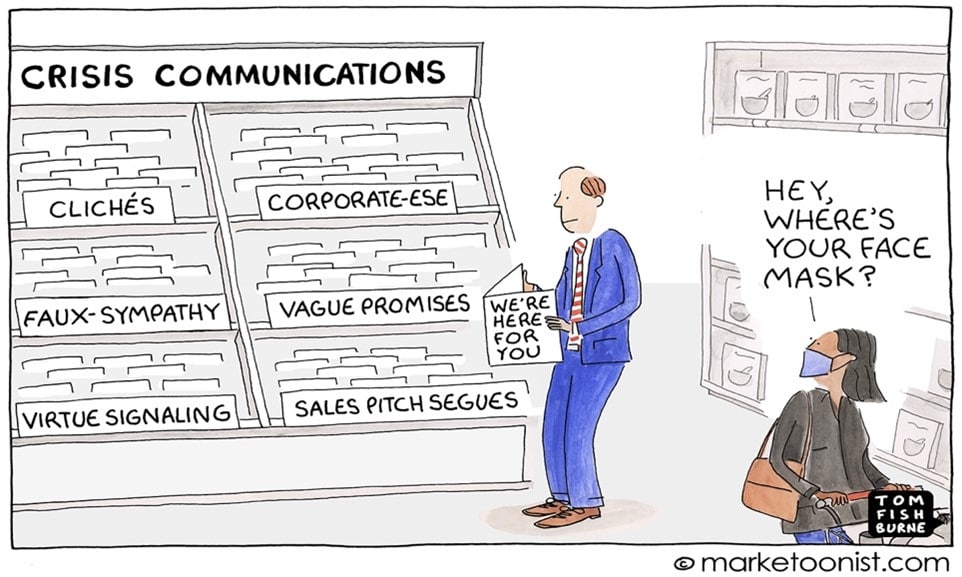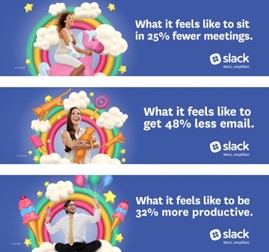‘We’re here for you through this unprecedented, difficult time’. How often have we read those words since March? Accountants, email providers, hell — even that random office supplies box you signed up to years ago are proffering their sincere and supportive words direct to your inbox. Does it evoke feelings of comfort? Or do the more cynical of us roll our eyes before pressing delete for the fourth time that morning. Hop over to social media, however, and we’re all happily sharing that sarky meme about how utterly rubbish 2020 has been. Perhaps the latter is more appealing because it resonates with our actual state of mind. It’s funny, silly and takes our minds off what really has been a tough slog for many. Humour in marketing can make all the difference in a workplace environment.
By: Victoria Heyward
In the UK, we tend to favour comedians who make witty and satirical comments about current affairs — think Russell Howard, Peter Kay and Lee Mack. The one big thing that unites us currently is that we’re all in it together — a decidedly British motto which tends to bring comfort in times of adversity.
The use of humour in any B2B marketers campaign is a tricky tightrope to walk. Do it well and you unite your audience; fail and you risk alienating them or even facing a backlash that can taint a company’s reputation for years to come. With this in mind, is it even worth the risk? The trick is to stop thinking of all B2B marketers as serious, suited types and act more like a B2C marketing team. At the end of the day, we’re all just humans who like to laugh.
Which type of humour to use?
Tom Fishburne, aka The Marketoonist, spoke about using humour in marketing campaigns at the Festival of Marketing this October, citing that the use of light-hearted humour (as per the image on the left) was an ‘act of empathy’ which ‘resonates positivity with the audience you’re trying to connect with’. And one B2B brand doing this is Slack.
Slack takes inspiration from B2C brands by bringing in a light-hearted and conversational approach to their messaging. CMO Bill Macaitis explains his theory behind bringing humour to their marketing strategy:
‘Developing your brand tone and voice is an important first step to delivering a cohesive brand. At Slack, we focus on being humble, authentic, humorous and human. A big part of building trust with your brand is being transparent, which should be the basis for every interaction. For Slack, that manifests itself in the big and little things … the welcome message when Slack is loading, the way we respond to tweets, even our release notes.’
Challenging the norm with B2B Humour
Slack isn’t the only B2B brand taking a leap of faith into the humour arena. Online accounting giant Xero aims to appeal to its audience (small businesses) by recording fun videos, one featuring a cute robot who enlightens a business owner about the free time he could carve out to have FUN if he used the software. Using a funky synth track in the background, the ad brings warmth with their characters and storylines.
And project Management software company Monday.com takes things a little further with their promotional video where the protagonist aims to motivate the Monday.com team with an automated cookie machine. It’s cheap laughs, but manages to showcase the benefits of the software and app with an idea that surely would make everyone’s life better if it were real. Both Xero and Monday.com are taking tentative steps to differentiate themselves from their competitors, but perhaps their target markets are more likely to be engaged as both offer software suitable for many levels of decision-makers. Therefore there is room for being a little more relaxed in their advertising approach — building brand awareness in the style of a B2C brand. For B2B brands with a more niche persona to target and leads to generate, convincing stakeholders that a humorous marketing campaign is the right route to go down could be a tougher fight in the ring.
Having a contingency plan if all goes bonkers
What happens when humour goes wrong? Adam Hunt, founder of White Label Comedy — an initiative to bring the laughs back to stuffy marketing campaigns — warns that the line is a thin one, and companies must think carefully about their target audience before including comedy in their plans. Steering clear of making divisive or derogatory comments is advised, as is self-defeating humour (putting yourself down) and aggressive humour (putting others down).
Hunt has been working closely alongside companies to inject humour into their B2B marketing material. In a recent podcast he advises ‘You just need to make sure the jokes you’re making (and the way you’re making them) are in line with the beliefs and interests of your audience. Don’t make jokes that split your audience down the middle, make jokes that bring them together.’
Recommended Read: How To Boost B2B Loyalty Engagement With Loyalty Auctions
The bottom line seems to be that there not only is space in B2B marketing for humour but by acting more like a B2C brand, you can engage on a more human level with your audience, building brand engagement and loyalty. That’s not to say the risk of appearing tone-deaf isn’t real. To counter this, Adam Hunt advises to always add a ‘sense-check phase that double-checks that any opinions expressed by a joke are ones that your audience agree with’. He does with a hive-mind of comedy writers, but any B2B organisation should have a trusted panel in place to ensure what one person finds hilarious, isn’t actually about to damage the brand beyond repair.
With great hilarity it seems, comes great responsibility.
Victoria Heyward is Brand Marketing and Communications Manager at Bright.






